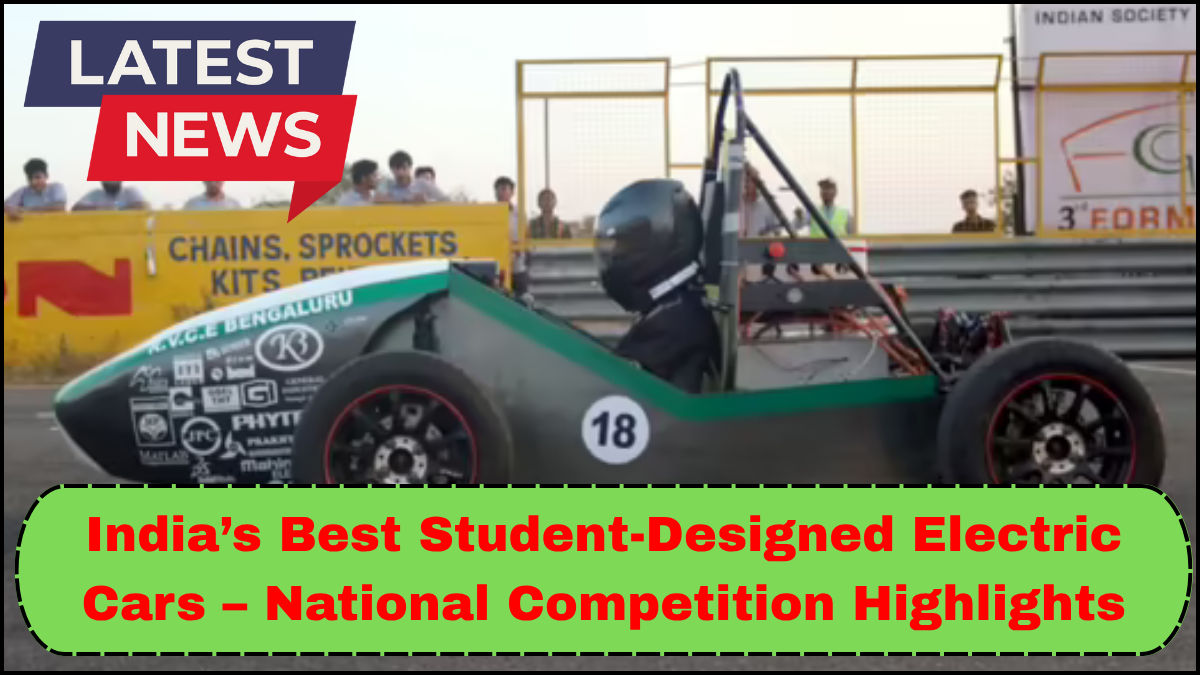India is witnessing a surge in innovation in the electric vehicle (EV) space, and leading this charge are students from engineering institutes across the country. In a recent national EV competition, student teams from premier universities showcased cutting-edge designs, pushing the boundaries of what’s possible with electric mobility. These events have become breeding grounds for India’s top student-designed electric cars, reflecting a blend of technical mastery, sustainable thinking, and real-world application.

The Rise of EV Competition India: A Platform for Innovation
EV competitions in India have evolved into serious arenas for automotive experimentation. Events like SAE India’s eBAJA and Formula Bharat provide students with the opportunity to design, build, and race electric vehicles from scratch. These platforms serve as more than just contests — they are incubators of talent and testing grounds for future engineers.
In these competitions, students are tasked with creating high-performance, energy-efficient electric vehicles that can handle endurance tracks, acceleration tests, and design scrutiny. The rules are strict, the judging is technical, and the competition is fierce. But the outcomes are game-changing — not just for the students, but for the future of the Indian EV industry.
Top Institutions Leading the Charge
India’s top student-designed electric cars are being developed by some of the country’s most prestigious institutions. Teams from IIT Madras, VIT Vellore, Delhi Technological University (DTU), and RV College of Engineering, among others, have consistently stood out for their innovative EV prototypes.
For example, Team Raftar from IIT Madras impressed judges with their electric formula race car that featured regenerative braking, an ultra-light carbon fiber body, and custom-built battery packs. Meanwhile, VIT’s team showcased a compact EV optimized for urban mobility, complete with IoT integration for real-time diagnostics.
Each of these projects is more than just a college assignment — it’s a microcosm of the challenges and possibilities in EV engineering.
Engineering Excellence Meets Real-World Application
The student teams don’t just assemble vehicles; they conduct thorough research and apply advanced engineering principles in areas such as aerodynamics, energy management, drivetrain optimization, and battery safety. CAD modeling, finite element analysis (FEA), and dynamic simulation are integral parts of their design process.
The best cars go through rigorous testing cycles, including multiple prototypes, track trials, and data-driven refinements. Some even integrate solar charging and machine learning algorithms to optimize performance, showcasing how student auto innovation in India is aligning with global trends in smart and sustainable mobility.
Sustainability as a Core Design Element
Another key highlight of these competitions is the focus on sustainability. With India’s growing emphasis on green mobility, student teams are incorporating eco-conscious materials, recyclable components, and energy-efficient drivetrains in their EVs. Some even experiment with bio-composites and modular battery systems designed for easy upgrades and repairs.
This not only prepares students for the real-world EV sector but also introduces new possibilities for commercial applications. The focus is shifting from just building a fast car to creating one that is viable, sustainable, and scalable.
Impact on India’s Future EV Landscape
The innovations seen in these competitions are already influencing India’s electric vehicle ecosystem. Several automotive companies and startups are now recruiting directly from these student teams, valuing their hands-on experience and problem-solving capabilities.
Moreover, some student-led EV projects have spun off into independent startups, receiving funding to further develop their concepts. These success stories underline the importance of student auto innovation in accelerating India’s transition to electric mobility.
FAQs
Q1. What are some notable EV competitions in India for students?
A: Major competitions include SAE eBAJA, Formula Bharat, and ASME HPVC. These events challenge student teams to design and build electric or hybrid vehicles under real-world performance parameters.
Q2. Which colleges are known for India’s top student-designed electric cars?
A: IIT Madras, VIT Vellore, DTU, and RV College of Engineering are among the leaders, often securing top positions in national EV contests.
Q3. What technologies do student EVs commonly feature?
A: Technologies include regenerative braking, custom battery management systems, lightweight chassis designs, AI-based telemetry, and solar energy integration.
Q4. How do these student competitions impact India’s EV industry?
A: They serve as incubators for innovation, preparing skilled engineers and fostering startups that contribute directly to the growing Indian EV ecosystem.
Q5. How are students incorporating sustainability in their EV designs?
A: Teams use recyclable materials, efficient motors, and energy optimization algorithms. Some even explore biodegradable composites and modular architectures for future adaptability.
click here to learn more